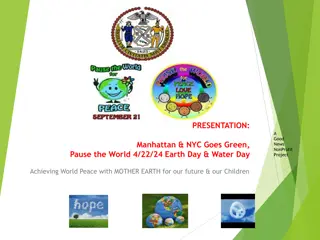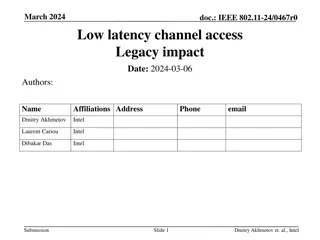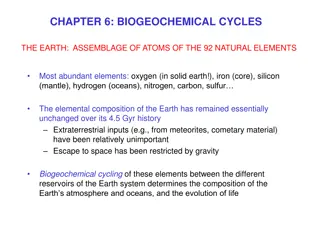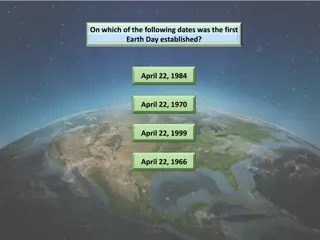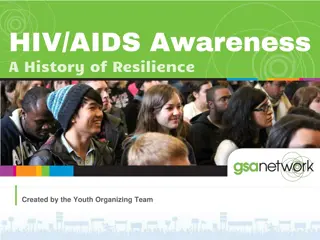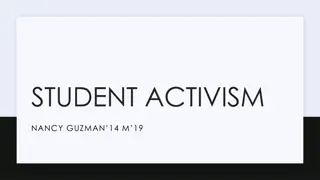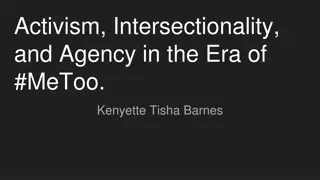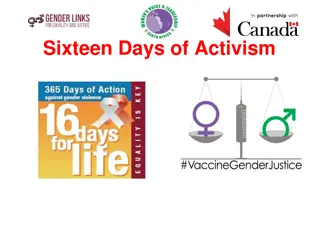History and Impact of Earth Day: A Legacy of Environmental Activism
Senator Gaylord Nelson's initiative of Earth Day in 1970 sparked a global movement for environmental awareness and action. The event led to the establishment of key environmental laws and agencies, symbolizing a pivotal moment in history for the planet. Earth Day continues to evolve as a significant platform to address urgent environmental challenges, mobilizing individuals worldwide to advocate for sustainability and a cleaner future.
Download Presentation

Please find below an Image/Link to download the presentation.
The content on the website is provided AS IS for your information and personal use only. It may not be sold, licensed, or shared on other websites without obtaining consent from the author. Download presentation by click this link. If you encounter any issues during the download, it is possible that the publisher has removed the file from their server.
E N D
Presentation Transcript
Earth Day April 22nd Student Health & Human Services Office of Human Relations, Diversity & Equity June 2022
Would you rather... Have a pet dragon Have a pet gargoyle
Objectives LEARN THE HISTORY OF EARTH DAY DISCUSS THE IMPORTANCE OF THE DAY LEARN WHAT YOU CAN DO
Senator Gaylord Nelson, a junior senator from Wisconsin, had long been concerned about the deteriorating environment. History of Earth Day January 1969 the worldwitnessed the ravages of a massive oil spill in Santa Barbara, California. Senator Nelson announced the idea for a teach-in on college campuses and persuaded Pete McCloskey, a Republican Congressman, to serve as his co-chair. They recruited Denis Hayes, a young activist, to organize the campus teach-ins. They choose April 22, a weekday falling between Spring Break and Final Exams, to maximize student participation.
What Came Next? The first Earth Day led to the creation of the Environmental Protection Agency 1970 Congress passed the National Environmental Education Act, the Occupational Safety and Health Act, and the Clean Air Act. 1972 Congress passed the Clean Water Act. 1973 Congress passed the Endangered Species Act and soon after the Federal Insecticide, Fungicide, and Rodenticide Act. 1990 -Earth Day went global, mobilizing 200 million people in 141 countries and lifting environmental issues onto the world stage. Earth Day 1990 gave a huge boost to recycling efforts worldwide and helped pave the way for the 1992 United Nations Earth Summit in Rio de Janeiro
What is the most interesting thing you've learned so far about the history of Earth Day?
Earth Day Today... Earth Day is the largest secular observance in the world. More than a billion people participate as a day of action to change human behavior and create global, national and local policy changes. The fight for a clean environment continues with increasing urgency, as the ravages of climate change become more and more apparent every day.
What is the most important issue regarding ourEarth today? What can be done about it?
What Can You Do? Acts of Green: organize a tree planting in your city Civic Action: Advocate for climate action at your school/district Community Action: Become a citizen scientist Individual Action: make your next meal plant based, recycle For more information about these and other steps to help the planet, visit https://www.earthday.org/take-action-now/
What is one thing you can commit to doing to help our Earth?
Which is better?
Human Relations, Diversity & Equity

















